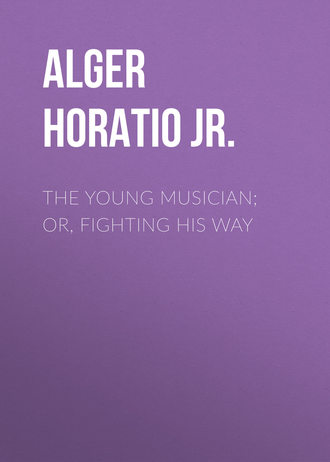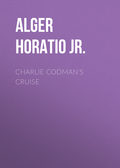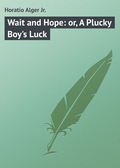
Alger Horatio Jr.
The Young Musician; Or, Fighting His Way
CHAPTER XXIV. LORENZO RICCABOCCA
Philip’s reputation as a musician was materially increased by his second night’s performance. To adopt a military term, he had crossed swords with the veteran fiddler, Paul Beck, and, in the opinion of all who heard both, had far surpassed him.
This was said openly to Philip by more than one; but he was modest, and had too much tact and good taste to openly agree with them. This modesty raised him higher in the opinion of his admirers.
He was invited by the Blakes to prolong his visit, but preferred to continue on his journey—though his plans were, necessarily, not clearly defined.
Andrew Blake carried him five miles on his way, and from that point our hero used the means of locomotion with which nature had supplied him.
Some six miles farther on there was a manufacturing town of considerable size, named Wilkesville, and it occurred to him that this would be a good place at which to pass the night.
Something might turn up for him there. He hardly knew what, but the two unexpected strokes of luck which he had had thus far encouraged him to think that a third might come to him.
Philip continued on his way—his small pack of clothing in one hand and his violin under his arm. Being in no especial hurry—for it was only the middle of the forenoon—he bethought himself to sit down and rest at the first convenient and inviting place.
He soon came to a large elm tree, which, with its spreading branches, offered a pleasant and grateful shade.
He threw himself down and lay back on the greensward, in pleasant contemplation, when he heard a gentle cough—as of one who wished to attract attention. Looking up he observed close at hand, a tall man, dressed in black, with long hair, which fell over his shirt collar and shoulders.
He wore a broad collar and black satin necktie, and his hair was parted in the middle. His appearance was certainly peculiar, and excited our hero’s curiosity.
“My young friend,” he said, “you have chosen a pleasant resting-place beneath this umbrageous monarch of the grove.” “Yes, sir,” answered Philip, wondering whether the stranger was a poet.
“May I also recline beneath it?” asked the newcomer.
“Certainly, sir. It is large enough to shelter us both.”
“Quite true; but I did not wish to intrude upon your meditations.”
“My meditations are not of much account,” answered Philip, laughing.
“I see you are modest. Am I right in supposing that yonder case contains a violin?”
“Yes, sir.”
“Then you are a musician?”
“A little of one,” replied Philip.
“May I ask—excuse my curiosity—if you play professionally?”
“Perhaps he may help me to an engagement,” thought our hero, and he said readily, “I do.”
“Indeed!” said the stranger, appearing pleased. “What style of music do you play?”
“For each of the last two evenings I have played for dancing-parties.”
“Alone?”
“Yes.”
“You do not confine yourself to dancing-music?”
“Oh, no! I prefer other kinds; but dancing-tunes seem most in demand, and I have my living to make.” The stranger seemed still more gratified.
“I am delighted to have met you, Mr.– Ahem!” he paused, and looked inquiringly at Philip.
“Gray.”
“Mr. Gray, I believe Providence has brought us together. I see you are surprised.”
Philip certainly did look puzzled, as he well might.
“I must explain myself more clearly. I am Professor Lorenzo Riccabocca, the famous elocutionist and dramatic reader.”
Philip bowed.
“Doubtless you have heard of me?” said the professor inquiringly.
“I have never lived in large places,” answered Philip, in some embarrassment, “or no doubt your name would be familiar to me.”
“To be sure, that must make a difference. For years,” said the professor, “I have given dramatic readings to crowded houses, and everywhere my merits have been conceded by the educated and refined.”
Philip could not help wondering how it happened in that case that the professor should look so seedy. A genius appreciated so highly ought to have brought in more gold and silver.
Perhaps Professor Riccabocca understood Philip’s expressive look, for he went to to say:
“The public has repaid me richly for the exercise of my talent; but, alas, my young friend, I must confess that I have no head for business. I invested my savings unwisely, and ascertained a month since that I had lost all.”
“That was a great pity!” said Philip sympathizingly.
“It was, indeed! It quite unmanned me!” said the professor, wiping away a tear. “I felt that all ambition was quite gone, and I was mad and sick. Indeed, only a week since I rose from a sick-bed. But Lorenzo is himself again!” he exclaimed, striking his breast energetically. “I will not succumb to Fate. I will again court the favor of the public, and this time I will take care of the ducats my admirers bestow upon me.”
“I should think that was a good plan,” said Philip.
“I will begin at once. Nearby is a town devoted to the mammon of trade, yet among its busy thousands there must be many that will appreciate the genius of Lorenzo Riccabocca.”
“I hope so,” answered Philip politely.
He could not help thinking that the professor was rather self-conceited, and he hardly thought it in good taste for him to refer so boastfully to his genius.
“I wish you, Mr. Gray, to assist me in my project,” continued the professor.
“How can I do so, sir?” inquired Philip.
“Let me tell you. I propose that we enter into a professional partnership, that we give an entertainment partly musical, partly dramatic. I will draw up a program, including some of my most humorous recitations and impersonations, while interspersed among them will be musical selections contributed by yourself. Do you comprehend?”
“Yes,” answered Philip, nodding.
“And what do you think of it?”
“I think well of it,” replied the boy-musician.
He did think well of it. It might not draw a large audience, this mixed entertainment, but it would surely pay something; and it would interfere with no plans of his own, for, in truth, he had none.
“Then you will cooperate with me?” said the professor.
“Yes, professor.”
“Give me your hand!” exclaimed Riccabocca dramatically. “Mr. Gray, it is a perfect bonanza of an idea. I may tell you, in confidence, I was always a genius for ideas. Might I ask a favor of you?”
“Certainly, sir.”
“Give me a touch of your quality. Let me hear you play.”
Philip drew his violin from its case and played for his new professional partner “The Carnival of Venice,” with variations—the same which had been received with so much favor the evening previous.
Professor Riccabocca listened attentively, and was evidently agreeably surprised. He was not a musician, but he saw that Philip was a much better player than he had anticipated, and this, of course, was likely to improve their chances of pecuniary success.
“You are a splendid performer,” he said enthusiastically. “You shall come out under my auspices and win fame. I predict for you a professional triumph.”
“Thank you,” said Philip, gratified by this tribute from a man of worldly experience. “I hope you will prove a true prophet.”
“And now, Mr. Gray, let us proceed on our way. We must get lodgings in Wilkesville, and make arrangements for our entertainment. I feel new courage, now that I have obtained so able a partner. Wilkesville little knows what is in store for her. We shall go, see, and conquer!”
An hour later Philip and his new partner entered Wilkesville.
CHAPTER XXV. A CHANGE OF NAME
Wilkesville was an inland city, of from fifteen to twenty thousand inhabitants.
As Philip and the professor passed along the principal street, they saw various stores of different kinds, with here and there a large, high, plain-looking structure, which they were told was used for the manufacture of shoes.
“Wilkesville will give us a large audience,” he said, in a tone of satisfaction.
“I hope so,” said our hero.
“Hope so? I know so!” said the professor confidently. “The town is full of young men, employed in shoe-making. They are fond of amusement, and they will gladly seize an opportunity of patronizing a first-class entertainment like ours.”
The professor’s reasoning seemed good, but logic sometimes fails, and Philip was not quite so sanguine. He said nothing, however, to dampen the ardor of his partner.
“Let me see,” said the professor, pausing, “yonder stands the Wilkesville Hotel. We had better put up there.”
It was a brick structure of considerable size, and seemed to have some pretensions to fashion.
“Do you know how much they charge?” asked Philip prudently.
“No; I neither know nor care,” answered Professor Riccabocca loftily.
“But,” said Philip, “I haven’t much money.”
“Nor I,” admitted Riccabocca. “But it is absolutely necessary for us to stop at a first-class place. We must not let the citizens suppose that we are tramps or vagabonds. They will judge us by our surroundings.”
“There is something in that,” said Philip. “But suppose we don’t succeed!”
“Succeed? We must succeed!” said the professor, striking an attitude. “In the vocabulary of youth, there’s no such word as ‘fail’! Away with timid caution! Our watchword be success!”
“Of course, you have much more experience than I,” said Philip.
“Certainly I have! We must keep up appearances. Be guided by me, and all will come right.”
Philip reflected that they could not very well make less than their expenses, and accordingly he acceded to the professor’s plans. They entered the hotel, and Professor Riccabocca, assuming a dignified, important step, walked up to the office. “Sir,” said he, to the clerk, “my companion and myself would like an apartment, one eligibly located, and of ample size.”
“You can be accommodated, sir,” answered the young man politely. “Will you enter your names?”
Opening the hotel register, the elocutionist, with various flourishes, entered, this name: “Professor Lorenzo Riccabocca, Elocutionist and Dramatic Reader.”
“Shall I enter your name?” he asked of Philip.
“If you please.”
This was the way Professor Riccabocca complied with his request: “Philip de Gray, the Wonderful Boy-musician.”
He turned the book, so that the clerk could see the entries.
“We propose to give an entertainment in Wilkesville,” he said.
“I am glad to hear it,” said the clerk politely.
“After dinner I will consult you as to what steps to take. Is there anything in the way of amusement going on in town this evening?”
“Yes, there is a concert, chiefly of home-talent, in Music Hall. There is nothing announced for to-morrow evening.”
“Then we will fix upon to-morrow evening. It will give us more time to get out hand-bills, etc. Is there a printing-office in town?”
“Oh, yes, sir. We have a daily paper.”
“Is the office near at hand?”
“Yes, sir. It is on the corner of the next street.”
“That will do for the present. We will go up to our apartment. Will dinner be ready soon?”
“In half an hour.”
Here the servant made his appearance, and the professor, with a wave of his hand, said:
“Lead on, Mr. de Gray! I will follow.”
CHAPTER XXVI. A PROMISING PLAN
They were shown into a front room, of good size, containing two beds. The servant handed them the key, and left them.
“This looks very comfortable, Mr. de Gray,” said the professor, rubbing his hands with satisfaction.
“Why do you call me Mr. de Gray?” asked Philip, thinking he had been misunderstood. “It is plain Gray, without any de.”
“I am only using your professional name,” answered the professor. “Don’t you know people will think a great deal more of you if they suppose you to be a foreigner?”
Philip laughed.
“Is Lorenzo Riccabocca your true or professional name, professor?” he asked.
“Professional, of course. My real name—I impart it to you in the strictest confidence—is Lemuel Jones. Think of it. How would that look on a poster?”
“It would not be so impressive as the other.”
“Of course not; and the public need to be impressed. I thank thee for that word, Mr. de Gray. By the way, it’s rather a pity I didn’t give you a Spanish or Italian name.”
“But I can’t speak either language. It would be seen through at once.”
“People wouldn’t think of asking. You’d be safe enough. They will generally swallow all you choose to say.”
They went down to dinner presently, and the professor—Philip could not help thinking—ate as if he were half-starved. He explained afterward that elocutionary effort taxes the strength severely, and makes hearty eating a necessity.
After dinner was over the professor said:
“Are you content, Mr. de Gray, to leave me to make the necessary arrangements?”
“I should prefer that you would,” said Philip, and he spoke sincerely. “Probably you understand much better than I what needs to be done.”
“‘Tis well! Your confidence is well placed,” said the professor, with a wave of his hand. “Shall you remain in the hotel?”
“No, I think I will walk about the town and see a little of it. I have never been here before.”
Philip took a walk through the principal streets, surveying with curiosity the principal building’s, for, though there was nothing particularly remarkable about them, he was a young traveler, to whom everything was new. He could not help thinking of his late home, and in particular of Frank Dunbar, his special friend, and he resolved during the afternoon to write a letter to Frank, apprising him of his luck thus far. He knew that Frank would feel anxious about him, and would be delighted to hear of his success as a musician.
He went into a book-store and bought a sheet of paper and an envelope.
He had just completed his letter, when his partner entered the reading-room of the hotel with a brisk step.
“Mr. de Gray,” he said, “I have made all necessary arrangements. I have hired the hall for to-morrow evening—five dollars—ordered some tickets and posters at the printing-office, and secured a first-class notice in to-morrow morning’s paper. Everybody in Wilkesville will know before to-morrow night that they will have the opportunity of attending a first-class performance at the Music Hall.”
“It seems to me the necessary expenses are considerable,” said Philip uneasily.
“Of course they are; but what does that matter?”
“What is to be the price of tickets?”
“General admission, twenty-five cents; reserved seats, fifty cents, and children under twelve, fifteen cents. How does that strike you!”
“Will anyone be willing to pay fifty cents to hear us?” asked Philip.
“Fifty cents! It will be richly worth a dollar!” said the professor loftily.
“I suppose he knows best,” thought Philip. “I hope all will come out right. If it does we can try the combination in other places.”
CHAPTER XXVII. UNEXPECTED HONORS
The next morning at breakfast, Professor Riccabocca handed Philip a copy of the Wilkesville Daily Bulletin. Pointing to a paragraph on the editorial page, he said, in a tone of pride and satisfaction:
“Read that, Mr. de Gray.”
It ran thus:
“We congratulate the citizens of Wilkesville on the remarkable entertainment which they will have an opportunity of enjoying this evening at the Music Hall. Professor Lorenzo Riccabocca, whose fame as an elocutionist and dramatic reader has made his name a household word throughout Europe and America, will give some of his choice recitals and personations, assisted by Philip de Gray, the wonderful boy-musician, whose talent as a violin-player has been greeted with rapturous applause in all parts of the United States. It is universally acknowledged that no one of his age has ever equaled him. He, as well as Professor Riccabocca, will give but a limited series of entertainments in this country, having received flattering inducements to cross the Atlantic, and appear professionally in London, Paris, and the chief cities of the Continent. Fifty cents is the pitiful sum for which our citizens will have it put in their power to hear this wonderful combination of talent. This secures a reserved seat.”
Philip read this notice with increasing amazement.
“What do you think of that, Mr. de Gray?” asked the professor gleefully. “Won’t that make Wilkesville open its eyes, eh?”
“It has made me open my eyes, professor,” said Philip.
“Ha, ha!” said the professor, appearing amused.
“How soon are we to sail for Europe?” asked Philip, smiling.
“When Queen Victoria sends our passage-money,” answered Riccabocca, laughing.
“I see that your name is a household word in Europe. Were you ever there?”
“Never.”
“Then how can that be?”
“Mr. de Gray, your performances have been greeted with applause in all parts of the United States. How do you explain that?”
“I don’t pretend to explain it. I wasn’t aware that my name had ever been heard of a hundred miles from here.”
“It has not, but it will be. I have only been predicting a little. The paragraph isn’t true now, but it will be some time, if we live and prosper.”
“But I don’t like to be looked upon as a humbug, professor,” said Philip uneasily.
“You won’t be. You are really a fine player, or I wouldn’t consent to appear with you. The name of Riccabocca, Mr. de Gray, I may truthfully say, is well known. I have appeared in the leading cities of America. They were particularly enthusiastic in Chicago,” he added pensively. “I wish I could find a paragraph from one of their leading papers, comparing my rendering of the soliloquy in ‘Hamlet’ to Edwin Booth’s, rather to the disadvantage of that tragedian.”
“I would like to read the notice,” said Philip, who had very strong doubts as to whether such a paragraph had ever appeared in print.
“You shall see it. It will turn up somewhere. I laid it aside carefully, for I confess, Mr. de Gray, it gratified me much. I have only one thing to regret: I should myself have gone on the stage, and essayed leading tragic roles. It may not be too late now. What do you think?”
“I can tell better after I have heard you, professor,” answered Philip.
“True, you can. Mr. de Gray,” continued the professor, lowering his voice, “notice how much attention we are receiving from the guests at the tables. They have doubtless read the notice of our evening entertainment.”
Philip looked round the room, which was of good size, and contained some thirty or more guests, and he saw that the professor was right.
He met several curious glances, some fair ladies expressing interest as well as curiosity, and his face flushed.
“Gratifying, isn’t it?” said the professor, smiling.
“No, I don’t think it is,” answered our hero.
“Why not?” demanded Professor Riccabocca, appearing amazed.
“If all were true, it might be,” replied Philip. “As it is, I feel like a humbug.”
“Humbug pays in this world,” said the professor cheerfully. “By the way, there’s another little paragraph to which I will call your attention.”
Philip read this additional item:
“We understand that Professor Riecabocca and Mr. Philip de Gray have received a cable despatch from the Prince of Wales, inviting them to instruct his sons in elocution and music, at a very liberal salary. They have this proposal under consideration, though they are naturally rather reluctant to give up the plaudits of the public, even for so honorable a position.”
“Professor Riccabocca,” said Philip, considerably annoyed by this audacious invention, “you ought to have consulted me before publishing such a falsehood as this.”
“Falsehood, Mr. de Gray? Really I’m shocked! Gentlemen don’t use such words, or make such charges.”
“You don’t mean to say it’s true that we have received any such telegram?”
“No; of course not.”
“Then why didn’t I use the right word?”
“It’s an innocent little fiction, my young friend—a fiction that will do no one any harm, but will cause us to be regarded with extraordinary interest.”
Here the thought occurred to Philip that he, the future instructor of British royalty, had only just escaped from a poorhouse, and it seemed to him so droll that he burst out laughing.
“Why do you laugh, Mr. de Gray?” asked the professor, a little suspiciously.
“I was thinking of something amusing,” said Philip.
“Well, well! We shall have cause to laugh when we play this evening to a crowded house.”
“I hope so. But, professor, if we keep together, you mustn’t print any more such paragraphs about me. Of course, I am not responsible for what you say about yourself.”
“Oh, it will be all right!” said Riccabocca. “What are you going to do with yourself?”
“I shall practice a little in my room, for I want to play well to-night. When I get tired I shall take a walk.”
“Very wise—very judicious. I don’t need to do it, being, as I may say, a veteran reader. I wouldn’t rehearse if I were to play this evening before the president and all the distinguished men of the nation.”
“I don’t feel so confident of myself,” said Philip.
“No, of course not. By the way, can you lend me fifty cents, Mr. de Gray?”
“Certainly.”
“I don’t want to break a ten.”
Professor Riccabocca didn’t mention that the only ten he had was a ten-cent piece.
Slipping Philip’s half-dollar into his vest pocket, he said carelessly:
“We’ll take this into the account when we divide the proceeds of the entertainment.”
“Very well,” said Philip.
He went up to his room and played for an hour or more, rehearsing the different pieces he had selected for the evening, and then, feeling the need of a little fresh air, he took a walk.
In different parts of the town he saw posters, on which his name was printed in large letters.
“It seems almost like a joke!” he said to himself.
Just then he heard his name called, and, looking up, he recognized a young fellow, of sixteen or thereabouts, who had formerly lived in Norton. It seemed pleasant to see a familiar face.
“Why, Morris Lovett,” he exclaimed “I didn’t know you were here!”
“Yes; I’m clerk in a store. Are you the one that is going to give an entertainment tonight?”
“Yes,” answered Philip, smiling.
“I didn’t know you were such a great player,” said Morris, regarding our hero with new respect.
He had read the morning paper.
“Nor I,” said Philip, laughing.
“Are you going to Europe soon?”
“It isn’t decided yet!” Philip answered, laughing.
“I wish I had your chance.”
“Come and hear me this evening, at any rate,” said Philip. “Call at the hotel, at six o’clock, and I’ll give you a ticket.”
“I’ll be sure to come,” said Morris, well pleased.







